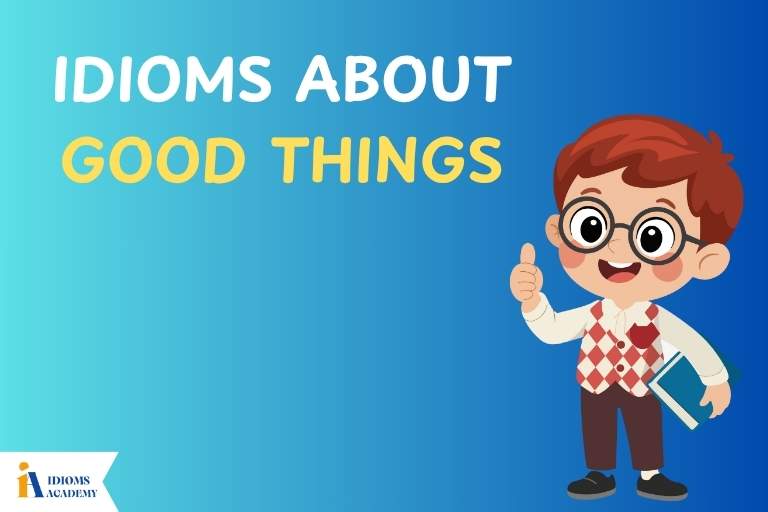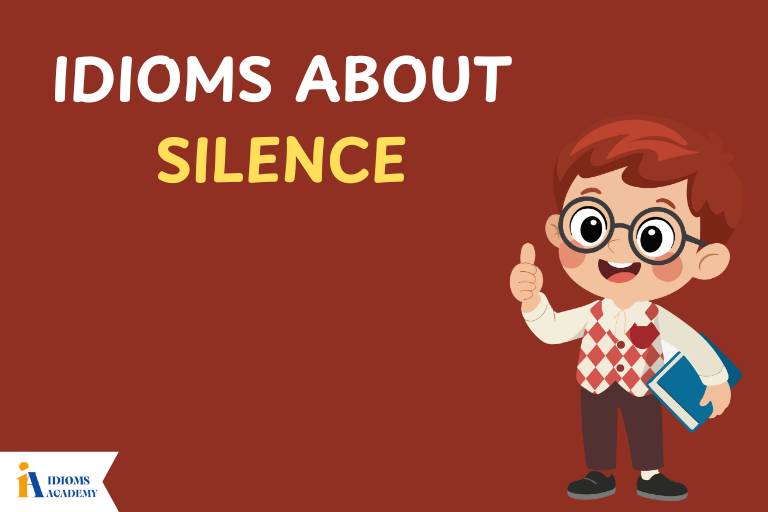Some people say things they never mean to keep. In the USA, we hear this a lot in daily life. It could be a friend who always says they’ll call but never does. Or maybe it’s a company that promises a free gift but never sends it. These are called empty promises. They are promises made without the plan to follow through.
In American English, we have many idioms to talk about these kinds of false promises. These sayings help us describe how it feels when someone lets us down. They are common in school, work, and even TV shows. In this article, we’ll learn 35 idioms about empty promises, what they mean, and how to use them in real life. These expressions are easy to learn and fun to use.
Idioms About Empty Promises
1. All talk and no action
Meaning: Someone who says they’ll do something but never does it.
Example Sentence:
– “Jake said he’d help, but he’s all talk and no action.”
– “Politicians are often all talk and no action.”
Other ways to say: Just words, no follow-through
Fun Fact/Origin: This idiom is often used in American politics.
Usage: When someone keeps making promises but doesn’t act.
2. Blow smoke
Meaning: To say things just to impress others without any truth.
Example Sentence:
– “He said he knew a famous actor, but I think he’s just blowing smoke.”
– “She was blowing smoke about getting free concert tickets.”
Other ways to say: Talk nonsense, make stuff up
Fun Fact/Origin: Comes from magicians who used smoke to hide tricks.
Usage: Used when someone talks big but can’t back it up.
3. Empty promise
Meaning: A promise that someone never plans to keep.
Example Sentence:
– “He gave her an empty promise about going to the fair.”
– “That company made an empty promise to fix the problem.”
Other ways to say: Fake promise, false promise
Fun Fact/Origin: Widely used in USA ads or customer service situations.
Usage: Used when someone promises something and doesn’t do it.
4. Cry wolf
Meaning: To keep lying until no one believes you anymore.
Example Sentence:
– “She cries wolf so much, we stopped listening.”
– “He said his dog was missing again, but he always cries wolf.”
Other ways to say: False alarm, lie over and over
Fun Fact/Origin: From an old story where a boy lies about a wolf.
Usage: Used when someone keeps making fake warnings or promises.
5. Talk is cheap
Meaning: It’s easy to say something but hard to actually do it.
Example Sentence:
– “He said he’d fix it, but talk is cheap.”
– “She always says she’ll study harder, but talk is cheap.”
Other ways to say: Words don’t mean much, actions matter
Fun Fact/Origin: Commonly used in sports and business in the U.S.
Usage: When someone says something but doesn’t show real effort.
6. A lot of hot air
Meaning: Talking without meaning or action.
Example Sentence:
– “The ad was just a lot of hot air.”
– “He’s full of hot air about being a great singer.”
Other ways to say: All bluff, nonsense talk
Fun Fact/Origin: “Hot air” was once used to describe bragging in the 1800s.
Usage: Used when someone brags but has nothing to show.
7. Lead someone on
Meaning: To make someone believe something that’s not true.
Example Sentence:
– “She led him on with fake promises.”
– “He led us on by giving us raises.”
Other ways to say: Trick someone, give false hope
Fun Fact/Origin: Common in dating or business talk.
Usage: When someone pretends to do something good but doesn’t.
8. Pull the wool over someone’s eyes
Meaning: To trick someone into believing a lie.
Example Sentence:
– “He tried to pull the wool over our eyes with fake deals.”
– “She pulled the wool over my eyes about the project.”
Other ways to say: Fool someone, trick
Fun Fact/Origin: From sheep’s wool — covering someone’s eyes to blind them.
Usage: Used when someone hides the truth with fake words.
9. Make empty threats
Meaning: To say scary things you don’t plan to do.
Example Sentence:
– “He keeps making empty threats about quitting.”
– “Parents sometimes give empty threats to scare kids.”
Other ways to say: Fake warnings, not serious
Fun Fact/Origin: Very common in homes, schools, and sports.
Usage: Used when someone pretends they’ll do something bad but won’t.
10. Sell someone a bill of goods
Meaning: To trick someone into believing a false idea.
Example Sentence:
– “They sold us a bill of goods about the product’s quality.”
– “He sold her a bill of goods with his sweet talk.”
Other ways to say: Mislead, fool
Fun Fact/Origin: Used when people were tricked into buying useless items.
Usage: Used in sales or when someone gets fooled by sweet promises.
11. String someone along
Meaning: To keep someone hopeful with no plan to help or act.
Example Sentence:
– “He strung her along with fake promises of a trip.”
– “She strung us along about finishing the work.”
Other ways to say: Mislead, delay on purpose
Fun Fact/Origin: Comes from puppet strings — keeping someone under control.
Usage: Used when someone keeps giving false hope.
12. Talk a good game
Meaning: To sound confident but not follow through.
Example Sentence:
– “He talks a good game but never shows up.”
– “She talked a good game during the meeting.”
Other ways to say: Talk big, make empty claims
Fun Fact/Origin: Common in sports or job interviews.
Usage: When someone sounds skilled but doesn’t act like it.
13. All bark and no bite
Meaning: Someone who talks tough but doesn’t take action.
Example Sentence:
– “He’s all bark and no bite when it comes to punishments.”
– “The manager is all bark and no bite.”
Other ways to say: No real action, just talk
Fun Fact/Origin: Refers to dogs that bark but don’t bite.
Usage: Used for people who make threats but don’t act.
14. Blow hot and cold
Meaning: To keep changing opinions or promises.
Example Sentence:
– “She blew hot and cold about going to the game.”
– “He blows hot and cold on working weekends.”
Other ways to say: Keep changing, not steady
Fun Fact/Origin: Based on the idea of switching from warm to cold quickly.
Usage: When someone isn’t clear or honest in what they want.
15. Carrot and stick
Meaning: To offer a reward or punishment but not really mean it.
Example Sentence:
– “The teacher used the carrot and stick method, but didn’t follow through.”
– “The company’s bonus plan was just a carrot and stick.”
Other ways to say: Tease with rewards, fake motivation
Fun Fact/Origin: Comes from farmers using carrots to lead donkeys.
Usage: Used when someone offers things they don’t mean to give.
16. Blow things out of proportion
Meaning: To make something seem bigger or better than it is.
Example Sentence:
– “He blew his skills out of proportion during the interview.”
– “She blew the deal out of proportion to get our hopes up.”
Other ways to say: Exaggerate, stretch the truth
Fun Fact/Origin: Often heard in ads and promises.
Usage: Used when someone makes big claims that aren’t true.
17. Just a pipe dream
Meaning: An idea or promise that will never happen.
Example Sentence:
– “Getting rich from one idea is just a pipe dream.”
– “He said he’d buy us all cars, but it was a pipe dream.”
Other ways to say: Not realistic, make-believe
Fun Fact/Origin: From old drug pipes, where users imagined strange things.
Usage: Used when someone promises something impossible.
18. Talk someone’s ear off
Meaning: To talk too much, often without meaning.
Example Sentence:
– “He talked my ear off about his new app, but nothing worked.”
– “She talks your ear off with empty promises.”
Other ways to say: Ramble, say too much
Fun Fact/Origin: Common saying across the U.S.
Usage: Used when someone talks a lot but says little that matters.
19. Smoke and mirrors
Meaning: Tricks to make something look better than it is.
Example Sentence:
– “Their sale was just smoke and mirrors.”
– “His big promises turned out to be smoke and mirrors.”
Other ways to say: Tricks, fake image
Fun Fact/Origin: From old magic acts using smoke and mirrors to fool people.
Usage: Used to describe fake setups or lies.
20. Pass the buck
Meaning: To avoid taking responsibility.
Example Sentence:
– “They passed the buck instead of solving the problem.”
– “He made promises, then passed the buck when it failed.”
Other ways to say: Shift blame, avoid work
Fun Fact/Origin: From card games — the “buck” was passed to avoid dealing.
Usage: When someone breaks a promise and blames someone else.
21. Bait and switch
Meaning: To offer one thing but give another.
Example Sentence:
– “The store used bait and switch on the sale.”
– “He baited us with a great plan, then switched it.”
Other ways to say: Trick, fake deal
Fun Fact/Origin: Often used in U.S. marketing complaints.
Usage: Used when someone changes the deal after making a promise.
22. Build castles in the air
Meaning: To make plans or promises that are not realistic.
Example Sentence:
– “She built castles in the air about becoming famous overnight.”
– “He made big plans, but they were castles in the air.”
Other ways to say: Dream big with no plan, wishful thinking
Fun Fact/Origin: From old English poetry.
Usage: Used when someone imagines things that won’t happen.
23. Break your word
Meaning: To go back on a promise.
Example Sentence:
– “She broke her word about helping me move.”
– “He broke his word and skipped the meeting.”
Other ways to say: Don’t keep a promise, lie
Fun Fact/Origin: A very old and formal idiom still used today.
Usage: When someone clearly doesn’t do what they said.
24. Pull a fast one
Meaning: To trick someone with a sneaky move.
Example Sentence:
– “He pulled a fast one by skipping the chores.”
– “The ad pulled a fast one with the fine print.”
Other ways to say: Trick, fool
Fun Fact/Origin: Common in card games or street scams.
Usage: Used when someone uses lies to escape or win.
25. Not worth the paper it’s written on
Meaning: A promise or contract that means nothing.
Example Sentence:
– “Their promise was not worth the paper it was written on.”
– “That deal wasn’t even worth the paper it was on.”
Other ways to say: Useless, worthless promise
Fun Fact/Origin: Refers to legal papers or fake deals.
Usage: When someone signs or says something with no value.
26. Full of it
Meaning: Not telling the truth or making things up.
Example Sentence:
– “He says he’ll win the lottery — he’s full of it.”
– “She’s full of it when she talks about her skills.”
Other ways to say: Lying, talking nonsense
Fun Fact/Origin: Polite version of “full of nonsense.”
Usage: Used to show disbelief in someone’s promise or story.
27. Too good to be true
Meaning: Something that sounds great but is likely fake.
Example Sentence:
– “The ad looked great, but it was too good to be true.”
– “His offer to fix it for free seemed too good to be true.”
Other ways to say: Not believable, fake offer
Fun Fact/Origin: Used in U.S. ads and internet scams.
Usage: Warns people about being tricked by nice-sounding promises.
28. Stretch the truth
Meaning: To change a story to make it sound better.
Example Sentence:
– “He stretched the truth about getting an award.”
– “She stretched the truth when she said she finished first.”
Other ways to say: Exaggerate, tell a half-truth
Fun Fact/Origin: Very common in casual U.S. conversations.
Usage: When someone adds false parts to a real story or promise.
29. Talk a blue streak
Meaning: To talk a lot, often with no meaning.
Example Sentence:
– “He talks a blue streak about getting a new car.”
– “She talked a blue streak and made no real point.”
Other ways to say: Ramble, chatter
Fun Fact/Origin: “Blue streak” means speed — very fast talking.
Usage: When someone talks nonstop and gives false hope.
30. Overpromise and underdeliver
Meaning: To say too much and do too little.
Example Sentence:
– “They overpromised and underdelivered on the new phone.”
– “He always overpromises and never finishes the job.”
Other ways to say: Fail to meet expectations
Fun Fact/Origin: A favorite term in U.S. business reviews.
Usage: Used when someone gives big promises but can’t keep them.
31. Sugarcoat it
Meaning: To make something sound nicer than it is.
Example Sentence:
– “She sugarcoated the delay in shipping.”
– “He sugarcoated the problem with sweet words.”
Other ways to say: Hide the truth, soften the blow
Fun Fact/Origin: From candy — making something bitter taste sweet.
Usage: When someone hides bad news under fake sweet words.
32. Build it up
Meaning: To make something seem better than it is.
Example Sentence:
– “He built up the new game, but it was boring.”
– “She built it up so much, we expected more.”
Other ways to say: Exaggerate, talk it up
Fun Fact/Origin: Common with movie trailers and product ads.
Usage: When someone makes a promise sound exciting but it’s not.
33. Paint a rosy picture
Meaning: To make something seem better or easier than it really is.
Example Sentence:
– “The teacher painted a rosy picture about the project.”
– “He painted a rosy picture of the event, but it was messy.”
Other ways to say: Make it look better, hide the truth
Fun Fact/Origin: Rosy colors suggest beauty and good feelings.
Usage: Used when people hide problems behind sweet promises.
34. Talk big
Meaning: To brag or promise more than you can do.
Example Sentence:
– “He talks big about getting rich fast.”
– “She talks big, but never helps.”
Other ways to say: Boast, exaggerate
Fun Fact/Origin: Often used in sports and shows.
Usage: When someone promises something they can’t back up.
35. Blow it out of the water (in reverse)
Meaning: To say something will be huge but it fails.
Example Sentence:
– “He said his idea would blow us away, but it didn’t work.”
– “She promised the show would blow it out of the water, but it was boring.”
Other ways to say: Overhype, fail to deliver
Fun Fact/Origin: Usually means “do great,” but here it’s the opposite.
Usage: When someone makes a big promise that turns into a flop.
Quiz: Idioms About Empty Promises
Instructions: Choose the best meaning for each idiom. Only one answer is correct. These questions are based on real situations that many Americans see at school, work, or in daily life.
Question Key
1. What does “all talk and no action” mean?
A) Someone who is very shy
B) Someone who says things but never does them
C) Someone who talks too slowly
2. What does “cry wolf” mean?
A) To call for help when it’s truly needed
B) To lie so often that no one believes you anymore
C) To scare animals away
3. What does “blow smoke” mean?
A) To cook something quickly
B) To speak without telling the truth
C) To clean the air
4. What does “lead someone on” mean?
A) To help someone understand a topic
B) To show someone the right direction
C) To give someone false hope
5. What does “empty promise” mean?
A) A promise made and kept
B) A promise that’s not real
C) A secret surprise
6. What does “talk is cheap” mean?
A) Talking doesn’t cost money
B) Talking means nothing without action
C) Talking is a great way to get rich
7. What does “pull the wool over someone’s eyes” mean?
A) To help someone dress warmly
B) To block someone’s vision
C) To trick someone into believing something false
8. What does “pipe dream” mean?
A) A dream while sleeping
B) A big wish that probably won’t happen
C) A type of water pipe
9. What does “pass the buck” mean?
A) To give someone money
B) To avoid taking responsibility
C) To pay for groceries
10. What does “too good to be true” mean?
A) Something amazing and very real
B) A gift that is always given
C) Something that sounds great but is likely false
11. What does “sugarcoat it” mean?
A) To put sugar on candy
B) To say something in a nicer way than it really is
C) To make cookies taste better
12. What does “overpromise and underdeliver” mean?
A) To make small promises and give big results
B) To promise too much and not deliver enough
C) To keep every promise perfectly
Answer Key
- B) Someone who says things but never does them
- B) To lie so often that no one believes you anymore
- B) To speak without telling the truth
- C) To give someone false hope
- B) A promise that’s not real
- B) Talking means nothing without action
- C) To trick someone into believing something false
- B) A big wish that probably won’t happen
- B) To avoid taking responsibility
- C) Something that sounds great but is likely false
- B) To say something in a nicer way than it really is
- B) To promise too much and not deliver enough
Wrapping Up
People in the USA often use idioms when someone makes promises they don’t keep. These phrases help explain how it feels when someone lets us down. Whether it’s in school, at work, or even in ads, these sayings remind us to trust actions, not just words.
Next time you hear a big promise, listen closely. Is it real, or just “hot air”? These idioms will help you figure that out.



